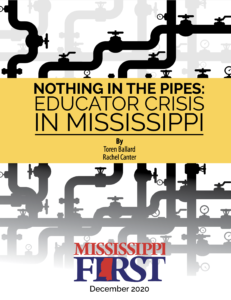- Teachers and Leaders
In recent years, a new problem in a decades-old challenge has emerged: the number of new Mississippi teachers has sharply declined, exacerbating the teacher shortage and threatening the success of public education in Mississippi.
In this investigation, Mississippi First examines the state of Mississippi’s educator pipeline, specifically how the number and diversity of candidates completing educator preparation programs have changed. We then present evidence showing how the rising cost of college attendance and the declining value of teacher salaries may be squeezing aspiring new teachers out of the profession. Finally, we offer a menu of recommendations for policymakers to address these interrelated financial barriers and reverse the alarming downturn in new teachers.
Major Takeaways
Finding #1
After years of relative stability, Mississippi’s pre-service educator pipeline is suddenly drying up—fast.
Finding #2
The growing “pay penalty” for Mississippi teachers—the result of stagnant salaries—may be forcing would-be teachers to move out of state or choose a new profession entirely.
Finding #3
Not only do aspiring Mississippi teachers have lower salaries to look forward to, they also have to pay more for the privilege, due to the skyrocketing cost of college and disappearing teacher-specific financial aid.
Finding #4
Stagnant salaries and sky-high tuition are forcing teachers to accept a lower standard of living—hardly the conditions necessary to reverse the rapidly worsening teacher shortage.
Policy Recommendations
Failing to address the financial viability of the teaching profession for new teachers could further deplete Mississippi’s pre-service educator pipeline in a moment when teachers are desperately needed. Thankfully, there are clear opportunities for policymakers to take decisive action.
Authors

Toren Ballard
Director of K-12 PolicyToren Ballard is the Director of K-12 Policy at Mississippi First. Nothing in the Pipes is his first major report published at Mississippi First. Toren was responsible for the 2020 release of the Public Perception of Charter Schools in Mississippi.

Rachel Canter
Executive DirectorRachel Canter is the Executive Director of Mississippi First and author of additional Mississippi First reports, including Leaving Last in Line, the State of Pre-K series, and Public Perception of Public Charter Schools (2019). Rachel founded Mississippi First in 2008.


